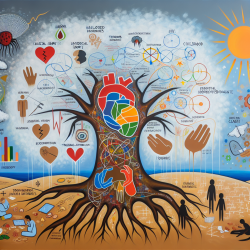Introduction
In the ever-evolving landscape of healthcare, interprofessional collaboration (IPC) stands out as a cornerstone for delivering high-quality patient care. The recent study titled "Variables associated with interprofessional collaboration: a comparison between primary healthcare and specialized mental health teams" provides valuable insights into the dynamics of IPC. This blog aims to distill the key findings of the research and offer practical guidance for practitioners looking to enhance their collaborative skills.
Key Findings from the Study
The study analyzed data from 315 mental health professionals in Quebec, working in either primary care teams (PCTs) or specialized service teams (SSTs). The research identified several variables that influence IPC:
- Knowledge Integration: A critical factor for both PCTs and SSTs, facilitating the blending of diverse expertise to address complex patient needs.
- Team Climate: A positive work environment enhances collaboration and is essential for both types of teams.
- Multifocal Identification: Professionals who identify with both their team and their profession tend to collaborate more effectively.
- Knowledge Sharing: Particularly important in PCTs, where the sharing of information and skills is crucial for managing common mental disorders.
- Organizational Support: Vital for SSTs, where complex cases require robust administrative and logistical backing.
- Age: Interestingly, younger professionals in SSTs were found to collaborate more, possibly due to their openness to new practices and teamwork.
Implications for Practitioners
For practitioners aiming to enhance their collaborative efforts, the study offers several actionable insights:
- Foster Knowledge Integration: Encourage team members to share insights and expertise across disciplines. This can be achieved through regular interdisciplinary meetings and joint case discussions.
- Enhance Team Climate: Create a supportive and inclusive work environment. Recognize and celebrate team achievements to boost morale and cohesion.
- Promote Multifocal Identification: Encourage professionals to see themselves as integral parts of both their team and their discipline. This dual identification can enhance commitment and collaboration.
- Prioritize Knowledge Sharing in PCTs: Implement systems that facilitate the easy exchange of information and best practices among team members.
- Strengthen Organizational Support in SSTs: Ensure that teams have the necessary resources and administrative support to manage complex cases effectively.
Conclusion
Interprofessional collaboration is not just a buzzword; it's a proven strategy for improving patient outcomes and job satisfaction among healthcare professionals. By understanding and implementing the variables associated with effective IPC, practitioners can enhance their collaborative skills and contribute to a more integrated healthcare system.
To read the original research paper, please follow this link: Variables associated with interprofessional collaboration: a comparison between primary healthcare and specialized mental health teams.










